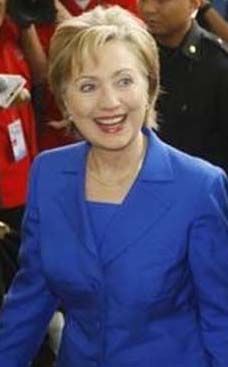
“It’s very important for Americans to gain international experience. The Peace Corps is a wonderful opportunity to volunteer and contribute to improving the lives of the least fortunate in our world. Direct experience with the daily struggles of men, women and children in developing countries is very valuable to any young American who wishes to make a strong contribution to ending hunger. University study programs that include agricultural science, economics, international development, political science, history and foreign languages give students a solid academic grounding, but the course of study matters less than a passion for international service, for reaching out beyond our borders to lend a helping hand to those struggling to live day to day.” Former Peace Corps Director Gaddi H. Vasquez was U.S. ambassador to U.N. food agencies based in Rome and is now Executive Director at the Annenberg Foundation Trust at Sunnylands.
Q&A with Gaddi Vasquez
Addressing World Hunger
Q&A with Gaddi Vasquez, U.S. Ambassador and Former Peace Corps Director
April 1, 2008
by Gail Matsunaga
From the streets of Orange to ancient roads leading to Rome, Gaddi Vasquez has seen many parts of the world — most recently as the eighth U.S. representative to the United Nations Food and Agriculture Agencies in Rome.
Vasquez returns to Orange County as the inaugural keynote speaker for Cal State Fullerton’s international conference, “Connecting Worlds,” taking place April 17 and 18 as part of the university’s 50th anniversary celebration.
From his Rome base, Vasquez addressed some questions about world hunger, his experiences as director of the Peace Corps and how today’s students can make a difference.
What is your main role as ambassador?
“I lead the mission staff in drawing attention to global problems of hunger and food insecurity, and in managing and ensuring the effective use of U.S. resources provided to the United Nations for the benefit of the poor, hungry and marginalized.”
What do you bring to your position?
“During my tenure in the Peace Corps, I had the opportunity to visit more than 60 countries and manage a large international organization. I met with heads of state and senior officials of governments throughout the world and worked to advance an understanding of the Peace Corps and the great work of its volunteers. The nature of my work entailed diplomacy and understanding the challenges, needs and opportunities in countries where the Peace Corps works. I believe that experience gave me the opportunity to develop some of the skills that are essential in my current position. On a very personal level, I have a deep passion for the work that I am involved in now. The challenges can be daunting and overwhelming
at times. But saving lives and giving hope to those in need is work I believe in and have been committed to for more than 20 years.”
What is the biggest challenge for this country as it relates to world hunger?
“The sheer magnitude of the hunger challenge is daunting. It’s tragic that one child dies every five seconds from hunger in our world. Perhaps our biggest challenge is, in the face of the hunger challenge, becoming discouraged with our progress or focusing on our own domestic problems. My experience has taught me that we need to treat this issue with a sense of urgency.”
What skills/areas of study do you think will be most valuable in meeting the challenges of the future and make the greatest impact?
“It’s very important for Americans to gain international experience. The Peace Corps is a wonderful opportunity to volunteer and contribute to improving the lives of the least fortunate in our world. Direct experience with the daily struggles of men, women and children in developing
countries is very valuable to any young American who wishes to make a strong contribution to ending hunger. University study programs that include agricultural science, economics, international development, political science, history and foreign languages give students a solid academic grounding, but the course of study matters less than a passion for international service, for reaching out beyond our borders to lend a helping hand to those struggling to live day to day.”
How would you characterize your experience as director of the Peace Corps?
“The Peace Corps has been successful because Americans have been willing to take on difficult jobs in difficult places. As director, I met thousands of volunteers and many of the people who benefited from their work. I look back on my tenure with satisfaction, fulfillment and appreciation for the unique opportunity to have led one of the finest organizations in the world. I had the opportunity to visit many countries and learn about traditions and cultures different than ours. The understanding and awareness I gained has transformed my life and brought me to the realization that our world is a very small place. Each of us has a responsibility to promote peace, friendship and understanding
here at home and abroad. I have witnessed the suffering that disease, poverty and violence have inflicted on men, women and children. It has made me grateful for what I have and taught me that we must do more to help people in need.”












